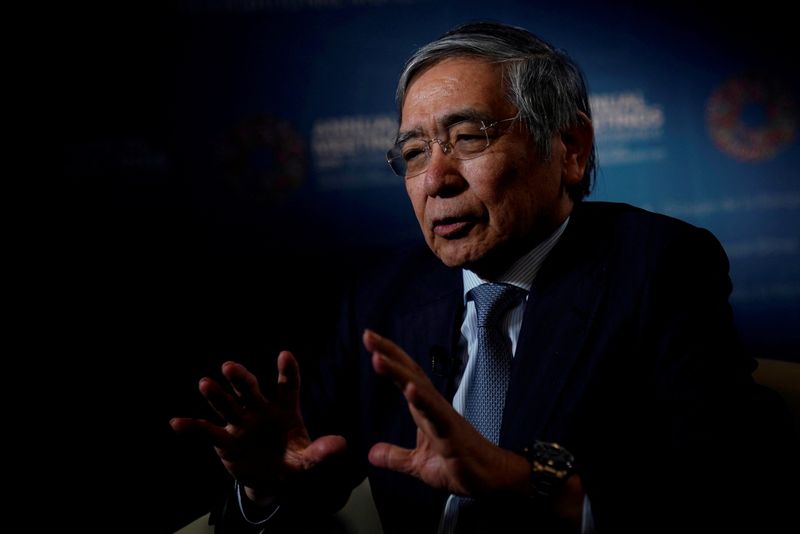By Leika Kihara
TOKYO (Reuters) - Haruhiko Kuroda leaves a mixed legacy after 10 years running the Bank of Japan (BOJ), achieving prices rises after decades of deflation and anaemic growth but without engineering durable expansion fuelled by domestic demand.
Kuroda jolted the conservative BOJ and global markets on taking office in March 2013 by announcing unprecedented purchases of bonds and other assets to stoke 2% inflation in two years.
He missed that goal by nearly a decade but immediately reversed a crippling rise in the yen and sent stocks and corporate profits soaring in Japan's export-reliant economy, arguably the biggest achievement of then-Prime Minister Shinzo Abe's signature "Abenomics" stimulus.
Inflation in the world's third-biggest economy is now double the BOJ target, but it is driven by rising raw-materials prices and the weaker yen. The task of generating self-sustaining growth with robust wage rises will fall to Kuroda's successor, academic Kazuo Ueda.
Ueda, on the BOJ policy board from 1998 to 2005, played a key role battling Japan's deflation during the an earlier spell of quantitative easing.
Kuroda, a pragmatic career bureaucrat who spent years tussling with the markets over a strong yen as he rose to become Japan's top financial diplomat, believes effective communication with the public as well as investors can enhance the effect of monetary policy, say people who worked under him or know him well.
His idea, they say, with setting the two-year deadline for 2% inflation was that the BOJ could enhance the psychological impact of its stimulus policy by showing its determination to meet the target.
Kuroda's approach was in stark contrast to that of his predecessor, Masaaki Shirakawa, who sealed the 2% target with the government and took then-radical stimulus measures - but undercut them with a message that smacked of bureaucratic caution.
'CRITICAL STAGE'
"When Kuroda became governor in 2013, I had doubts on whether the BOJ could change policy so radically. But it did by pledging by achieve 2% inflation in two years," former BOJ board member Goushi Kataoka told Reuters.
"The move underscored the BOJ's determination to end deflation. In this sense, the policy was highly effective," said Kataoka, who retired in July.
But the Kuroda shock began to fade as soon as 2014, when plunging oil prices and a sales tax hike derailed Japan's turn toward growth and inflation.
As its huge bond buying faced limits, the BOJ began its shift in 2016, switching to a policy of trying to control interest rates along the yield curve, the start of a gradual dismantling of Kuroda's radical experiment.
"Until 2014, the BOJ's policies were successful. At the very least, they ended deflation," said Columbia University professor Takatoshi Ito, a close associate of Kuroda. "But inflation expectations, or people's perception on future inflation, didn't change. The BOJ couldn't make full use of the benefits of an inflation targeting policy."
In his second five-year term, Kuroda shifted focus toward extending the lifespan of yield curve control (YCC), letting longer-term yields move more freely and compensating banks for the pain from ultra-low rates, including some below zero
"When Kuroda's reflationist narrative didn't work, the BOJ had little choice but to keep doing YCC," said former BOJ executive Kazuo Momma. "Abandoning YCC would mean the BOJ was retreating from ultra-loose policy, something unacceptable for Kuroda."
Kuroda now blames Japan's stubbornly deflationary mindset for delaying the achievement of his inflation target, a logic resembling that of the predecessor he denounced when he took office.

What the BOJ's decade-long effort showed was the challenge of breaking Japan's "adaptive" inflation expectations, which are strongly affected by underlying price moves and external shocks, BOJ Deputy Governor Masazumi Wakatabe said last week.
"We need to create a cycle in which wages and price hikes continue stably and sustainably," said Wakatabe, a vocal advocate of aggressive monetary easing who retires in March. "In this sense, we're at a critical stage."